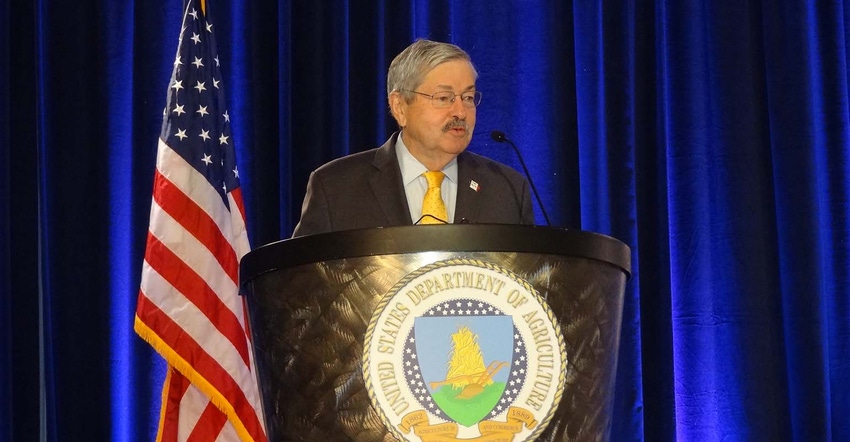
Although he hasn’t been confirmed yet to be the U.S. ambassador to China, Iowa Gov. Terry Branstad was confident President Donald Trump would bring a “win-win” approach to advancing bilateral trade agreements that benefit the United States as well as those countries across the negotiating table.
“No question President Trump wants to improve agreements we have in terms of trade. He feels the trade imbalance is too great,” regarding the $16 billion trade imbalance with Mexico Branstad told attendees at the U.S. Department of Agriculture Outlook Forum Thursday, Feb. 23. “I’m hopeful at the end of the day the President and his administration will work to improve bilateral agreements.”
When Branstad was questioned about Mexico’s threats to buy corn elsewhere, Branstad said he believes Trump’s book he wrote about the art of the deal shows that he wants the best deal, which is a win-win for both countries.
Branstad said the United States has some advantages compared to other world grain competitors. Brazil has problems with transportation infrastructure and Russia has issues with being able to preserve the food they produce. “I think we have natural advantages, especially if we upgrade infrastructure. We are the most productive with the most innovative farmers. The big concern I’ve got is that we get a level playing field and the opportunity to compete on a level playing field.”
Although Branstad did not dive deep into what he would push as ambassador to China, he did say he hopes his long-standing personal relationship with China’s president will hopefully break down some of these barriers of getting biotechnology traits approved and getting U.S. beef back into China, specifically so he can serve it at the Embassy and the growing number of Chinese consumers adding protein to their diet can eat U.S. beef. He also shared he hopes to see the recent countervailing duties placed on U.S. dried distillers grains removed.
Branstad said food safety is one of China’s big concerns and partnering with them to address those concerns will be prudent. “We want to have fairness and openness,” Branstad said. “We have a bureaucracy problem, but they have an even bigger one.” He said he intends to use his personal relationship and hopes to be persuasive in convincing Chinese leaders of the importance of these issues to the relations of the two countries.
House Agriculture Committee chairman Mike Conaway (R., Texas) shared that he continues to communicate the vital importance of trade to all of production agriculture. In discussions with Trump’s top economic advisers he said they’ve discovered trade deficits have two pieces – and exports are a big deal.
In the discussion to focus on renegotiating bilateral agreements after withdrawing from the Trans Pacific Partnership, Conaway said because all ag industries except for rice producers were supportive of TPP “we have a yardstick to measure” if a new bilateral trade deal is better than TPP.
About the Author(s)
You May Also Like




